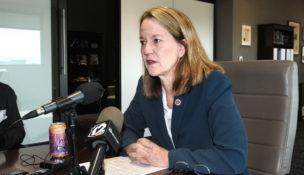Senate panel adopts stricter abortion rules
Arizona Capitol Reports Staff//June 12, 2009//[read_meter]
Senate panel adopts stricter abortion rules
Arizona Capitol Reports Staff//June 12, 2009//[read_meter]
Women who seek an abortion will have to wait at least 24 hours between the time they speak to a doctor about terminating a pregnancy and the actual procedure, under legislation adopted...
No tags for this post.

















